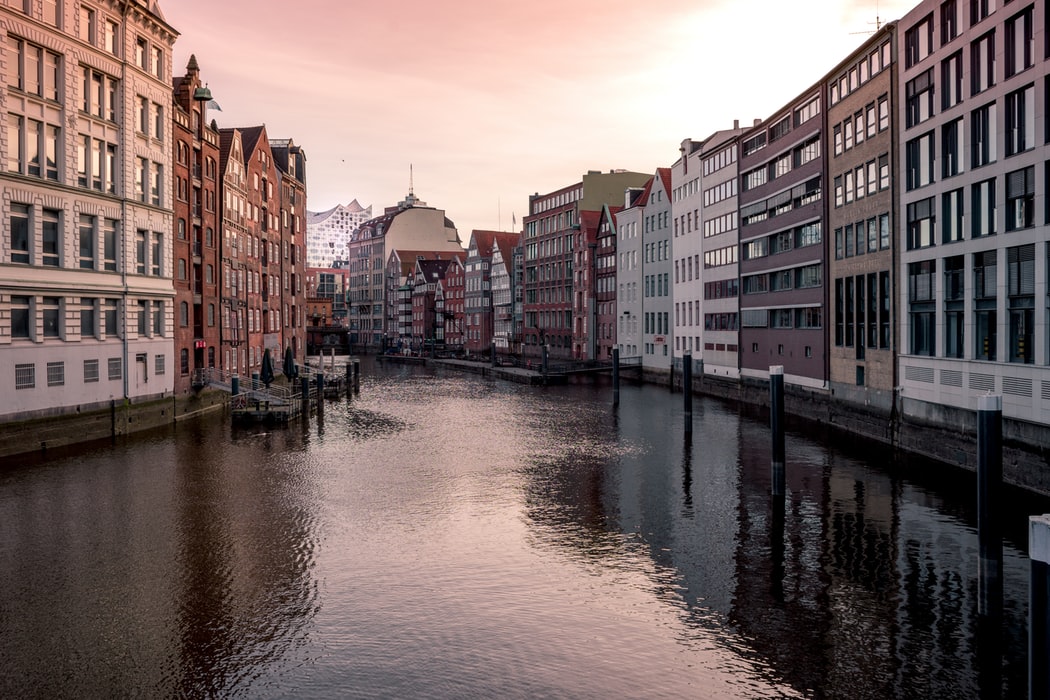Hamburg is located in northern Germany, close to the North and Baltic Sea. Both coasts offer further destinations to travel to if you want to extend your stay to experience the surrounding area. With more than 1.7 million inhabitants, Hamburg is Germany’s second largest city, after Berlin. Hamburg combines the typical dynamic atmosphere of a big city with a very unique maritime charm thanks to the popular harbour area as well as the beautiful Alster Lake. Frequently described as “the gateway to the world” by its proud citizens, (called Hamburger) the port city of Hamburg has for centuries welcomed merchants, traders, and sailors to a rich assortment of grand hotels, fine restaurants and bars.
Hamburg is a very green city that lacks high skyscrapers – church steeples characterize the landscape instead. The Alster Lake in the center is surrounded by the main shopping areas Mönckebergstraße to the east and Jungfernstieg to the south. The historic Speicherstadt district (which has a status of UNESCO World Heritage Site) and the newly opened (in 2017) cultural landmark Elbphilharmonie in HafenCity are places to see!
The Elbphilharmonie is a world-class concert hall located on the banks of the Elbe river. This impressive building contains three concert halls, WESTIN hotel, private apartments, and the publicly accessible Plaza with a 360° panoramic view of the city. The cross-section below provides you with a good overview of the building’s inner layout:
By the way, it is no exaggeration to say that it was in Hamburg that the Beatles started their career as a band!
I recommend you plan your trip and simplify your stay with the help of official digital Hamburg Tourism App with tips for harbour boat trips, attractions, bars, cafés, clubs, restaurants and events. Hamburg Tourism App is downloadable for Google Android or in the Apple App Store.
As well as the App, I am delighted to share my personal recommendations for going out in the Dinning & Bars section below.
Climate
Known for its long, grey winters, Hamburg is frequently treated to a pleasant spring come early April. Once the weather warms, the city’s mood visibly improves. One of the highlights of the season is Hafengeburtstag, in early May, when the Elbe comes alive with a long parade of ships and riverside festivities.
Local Business Etiquette and Customs
When doing business in North Germany, it is essential to know that this culture is strongly individualistic and demands respectful communication, personal distance (at least an arm’s length), punctuality and adherence to rules and regulations. Behaviour in public is generally reserved and formal. Germans are extremely punctual, so if you are going to be even slightly late, call ahead and explain your situation. Be five minutes early for business appointments.
There is strict separation between private life and work, as Germans believe that there is a right time and place for every activity.
In general conversation, Germans are very straightforward and often use only a few polite, phrases for a small talk. Typically, they get to the point rather quickly and expect to have results at the end of a meeting.
Business dress in Germany is understated. Even when dressed informally, they are neat and conservative. It is usually recommended to refrain from wearing heavy make-up and ostentatious jewellery or accessories.
The younger generation and people working in creative fields such as media, internet, start-ups, art, travel, etc. are more flexible and may not fall into the description above.
Travel and Transport
Hamburg Airport is 8 km (5 miles) to the city center. The S-bahn line No. 1 runs every 10 minutes from the airport to Hamburg’s main station (Hauptbahnhof). A taxi to the center of the city (Alstadt and Neustadt) will cost about €25. If you’re driving a rental car from the airport, follow the signs to “Zentrum” (Center). There is an Edeka supermarket on the arrivals level between Terminal 1 and 2. It’s a bit smaller than a full-size German supermarket and the prices are a bit higher than they would be in town. However, it is a great place to pick up some snacks or drinks for your hotel room or some food for an extended journey.
The Hamburg’s public transportation system, called HVV, includes the U-bahn (subway), the S-bahn (commuter train), ferries, buses, and express buses. All Information is available in English on the HVV website http://www.hvv.de/en/
Distance determines fares; a single trip costs €3.10 for longer journeys (such as the airport into Hamburg’s main station); €2.10 for shorter distances; and €1.50 if you’re only traveling a couple of stops. If you’re planning to make multiple trips about the city, then you may want to get the Tageskarte, or day pass, which for an adult and three children under 15 costs €7.50 when purchased before 9 am and €6 after that. An €11.20 Gruppenkarte is the best option for those traveling in a group. A group of five adults can use this card after 9 am on weekdays and all day on weekends. Tickets and passes are available in all buses and from vending machines in every U- or S-bahn station. HVV is partially based on the honor system – a ticket inspector may ask you to show the ticket during random checks. Those caught without a ticket are fined €60 on the spot. Prepared commuters can buy tickets and passes from the website and print them out, or use HVV’s smart-phone app.
Buses have dedicated traffic lanes, and most of their stops aren’t too close together, so travel tends to be fast. It’s a good way to see more of this beautiful city.
Hamburg Hauptbahnhof (Hamburg Main Station) is the city’s central hub for local, regional, long-distance, and international trains. Information is available in English on the Deutsche Bahn website https://www.bahn.com/en/view/index.shtml
Taxi meters start at €3.20, then add €2.35 per km for the first 4 km (2½ miles); €2.10 per km for the next 5 km (3 miles); and €1.45 per km after that. You can hail taxis on the street, outside subway and train stations, and at popular locations. You can also order one by phone Hansa-Taxi 004940211211, online, or with my-taxi app.
If you are in Hamburg between April to October I recommend experiencing Hamburg on a bike! Many hire stations throughout the entire city offer facilities round the clock for hiring and returning a StadtRAD is simple. Make sure you have registered online prior to hiring the bike.
Dining
CAFÉ PARIS www.cafeparis.net Rathausstr. 4, 20095 Hamburg
A flair of Paris in the heart of Hamburg, the-19th-century cafés is popular for lunch, coffee or dinner and offers superb traditional French cuisine – an ideal spot to take in the busy atmosphere and taste from the superb wine list. Tables may be hard to get without a reservation at usual dining times late in the week and on weekends.
NEUMANNS http://neumanns-bistro.de Lange Reihe 101, 20099 Hamburg
Neumann Bistro has top gourmet food and exclusive selection of wines. Very delicious dishes in a cosy atmosphere, suitable also for a business lunch or dinner.
COX www.restaurant-cox.de Lange Reihe 68, 20099 Hamburg
Cox has delighted guests with its nouvelle German cuisine for years, and with a cool, dark interior and red-leather banquettes remains one of the hippest places.
PORTUGIESENVIERTEL (PORTUGUESE QUARTER), the area located between Landungsbrücken and Baumwall, offers the feeling of Iberia in Hamburg. Famed for many tapas restaurants and little cafés on and around Ditmar-Koel-Strasse, the Portugiesenviertel is a great place to go for good quality, reasonably priced meals.
BULLEREI www.bullerei.com Lagerstr. 34 B, 20357 Hamburg
This extremely popular café and restaurant is a creation of celebrity-chef Tim Mälzer, an old friend of Jamie Oliver. Its located in a former livestock hall in the heart of the Schanze, and offers quality cuts of meat.
Fischbrotchen
Enjoy a classic Hamburg experience for just 2 euros, available everywhere, but I recommend tasting it at the Promenade on the Elbe River “Landungsbrücken”.
KARO FISCH RESTAURANT http://karofisch.wixsite.com/karofisch Feldstr. 32, 20357 Hamburg
Very nice, little, place in Schanze district for a quick, fishy meal, reasonably priced. The catch is freshly prepared. The seafood, mixed platter is highly recommended. There are just 5 or 6 tables, so be ready to wait a little or share the table with other guests, which can be fun too.
BROOKLYN BURGER BAR http://www.brooklynburgerbar.de/en/ Alter Fischmarkt 3, Hamburg
Very positive and relaxed environment. The dishes are homemade. Everything fresh. All burgers can be served as a VEGGIE version or skinny version with the Salad. The bar offers many cocktails and large selection of gin, etc..
SKYLINE BAR “20up” http://www.empire-riverside.de/en/hotel-restaurant-bars-hamburg/ Bernhard-Nocht-Straße 97, 20359 Hamburg
This is a must-see location with the spectacular views of the Elbe and port, situated on the 20th floor of the hotel Empire Riverside Hotel.
Beauty and Fitness
Hamburg is a very green city with an abundance of parks, rivers, canals and lakes, which offer excellent opportunity for jogging or biking outside. The Außenalster, lined with parklands, is the perfect place for jogging in Hamburg. In fact, it’s comparable to the Central Park reservoir in New York, with lots of joggers at peak times.
Planten un Blomen (entrance at the Stefansplatz U-Bahn station) used to be and old botanical gardens – now blended together to a greenbelt right downtown, Hamburg is a runner’s paradise! Loacted near to the Dammtor train station and Messe (Trade Fair).
Safety and Emergency Services
Hamburg is one of the safest cities in Germany. Generally, the U and S-bahn are very safe. If going out to touristic attractions in the Red Light District, Reeperbahn, St. Pauli or near Main Train Station just be aware of late night drunks, especially on the weekends and on days when one of Hamburg’s football teams are playing.
General emergency phone numbers:
112 (ambulance)
110 (police)
Public hospitals:
Universitätsklinikum Eppendorf, Martinistraße 52, 20246 Hamburg, Tel: +494074100
Lockers
For a small fee, you can safely and easily store your luggage in the Hamburg main station.
The DB Luggage Center is open from 8:00-20:00 everyday, €5 daily rent per piece of luggage.
The longterm-lockers are located on the northern runway between platforms 5 and 6 and 13 and 14. Prices: big locker – €6, small locker – €4 (for the day). The short-term lockers (up to 6 hours) are located by the southern runway. Prices: big locker – €4, small locker – €2.
You can also store your luggage at Hamburg airport at Terminal 2, level 1. It is possible to store luggage, bulky luggage and small pieces there for a fee of €3-5 per day.

